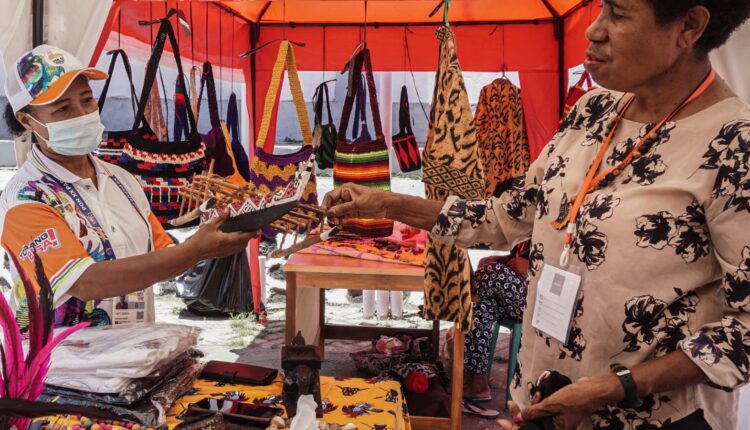Supporting the Government’s Strategy to Improve the Community’s Economy in Papua
Papua’s economic development is a top priority that must be immediately realized to achieve just and equitable prosperity in this region. The Papua Development Acceleration Master Plan (RIPPP) 2022-2041 acts as the main basis for development in the Papua region.
RIPPP, with the vision of an independent, just and prosperous Papua, as well as the mission of a healthy Papua, an intelligent Papua and a productive Papua, is expected to be able to accelerate Papua’s development in the next two decades. Therefore, supporting economic development in Papua is a crucial step to create sustainable prosperity for the Papuan people.
Development in Papua faces various challenges, but RIPPP is present as a strategic solution to overcome them. Deputy for Development at Bappenas, Tri Dewi Virgiyanti, emphasized the importance of RIPPP in supporting the acceleration of Papua’s development. RIPPP is not just a plan, but a strong foundation for realizing an independent and prosperous Papua. To achieve a healthy Papua, there needs to be quality and equitable health services, as well as a culture of healthy and clean living in the community.
The target is to reduce the stunting prevalence rate to below 10 percent, increase life expectancy, and achieve malaria elimination in all districts/cities by 2041.
Apart from health, education is also a main focus. With quality education, intelligent Papua will become a reality. Good educational services will form superior, creative, innovative and characterful individuals.
In 2041, it is hoped that the average length of schooling in the Papua region will reach 14.59–16.61 years. Quality education will be an important foundation for producing a generation of Papuans who are competitive at the national and international levels. Apart from that, increasing competence, creativity and innovation in developing local economic potential is also the main mission to create a productive Papua.
With this increase, the poverty and open unemployment rates in Papua are expected to fall to 5.81–2.82 percent and 4.11–1.73 percent respectively in 2041. Development of a competitive local economy will open up new jobs and increase people’s income.
To accelerate prosperity in Papua, access to basic infrastructure and connectivity must be improved. Improving environmental quality and implementing good development governance are also very important. Special attention must be given to customary land, culture and social harmony as the main prerequisites for achieving development goals.
RIPPP 2022-2041 becomes the legal umbrella and guidelines for planning, budgeting, implementation, and evaluation and control of accelerated development in Papua. The development policy direction for the Papua region has also been aligned with the Final Draft National Long Term Development Plan for 2025-2045.
Member of the Steering Committee for the Acceleration of Special Autonomy for Papua (BP3OKP) for Southwest Papua Province, Otto Ihalauw, emphasized the importance of overseeing the implementation of RIPPP. Good implementation requires synergy between central and regional governments, as well as community involvement. One of the big challenges is inequality between regions. Bappenas ensures that this issue has become a main concern in making policies and development strategies that are in line with the commitment to improving the welfare of the Papuan people.
The launch of RIPPP and the Papua Development Acceleration Information System (SIPPP) by Vice President Ma’ruf Amin marked an important moment in the history of Papua’s development. This launch is part of the government’s commitment to realizing Indonesia-centric development and reducing disparities between regions.
Papuan development policies and strategies continue to be encouraged to strengthen the role of the new autonomous regional government in improving the welfare of indigenous Papuans, one of which is through strengthening regulations. The Papua Development Acceleration Master Plan (RIPPP) 2022-2041 carries the big vision of “Realizing an Independent, Fair and Prosperous Papua,” with three main missions, namely Healthy Papua, Smart Papua and Productive Papua.
The direction of Papua’s development policy has also been aligned with the Final Draft National Long Term Development Plan 2025-2045 with the theme “Accelerating the Development of the Papua Region towards a Healthy, Smart and Productive Papua.” This design and planning framework is expected to bring new enthusiasm, paradigms and breakthroughs. to realize a leap in Papua’s prosperity in the next 20 years.
SIPPP is another strategic breakthrough in efforts to accelerate Papua’s development. SIPPP is expected to play an important role in development planning by the central and regional governments, aligning development planning at the central and regional levels, as well as monitoring, controlling, reporting and evaluating the implementation of development plans.
It is also hoped that SIPPP can be accessed and utilized by all central and regional stakeholders, including the community, in development planning in the Papua region. The integration of SIPPP with various other information system platforms will increase the effectiveness and efficiency of the system, as well as support strengthening development governance in the Papua region.
For this reason, all elements of society must unite in supporting the implementation of RIPPP. With the spirit of mutual cooperation and shared commitment, fair and equitable development in Papua is not just a dream, but a reality that can be realized.
The government, community and all stakeholders must work together to overcome various existing challenges and create an independent, just and prosperous Papua. Only with synergy and collaboration can Papua achieve significant progress in the next two decades. With quality education and health services, adequate infrastructure, and good development governance, Papua will become a region that is able to compete and make a major contribution to Indonesia. Let’s together support the economic development of Papua for the welfare of its people and the progress of the Indonesian nation.
